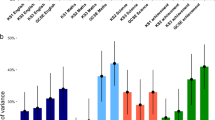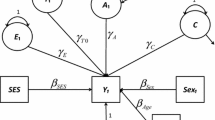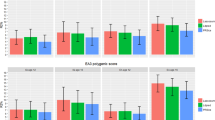Abstract
The covariance among measures of cognitive ability, temperament, and scholastic achievement was examined in a subsample of 326 (89 Monozygotic, 74 Dizygotic) twins drawn from the Western Reserve Twin Project. Both phenotypic and behavioral genetic models were fit to the data. Univariate analyses indicate significant genetic influences on cognitive, achievement, and temperament variables. Common environmental influences also affected cognition and achievement but not temperament. Multivariate analyses indicate that both genetic and common environmental influences contribute to the covariance among all three variables. Cognition and achievement are highly genetically correlated. In contrast, achievement and temperament are highly correlated for common environmentality, while cognition and temperament are not.
Similar content being viewed by others

References
Bollen, K. A. (1989).Structural Equations with Latent Variables, Wiley, New York.
Brody, E. B., and Brody, N. (1976).Intelligence: Nature, Determinants, and Consequences, Academic Press, New York.
Brooks, A., Fulker, D. W., and Defries, J. C. (1990). Reading performance and general cognitive ability: A multivariate genetic analysis of twin data.Personal. Indiv. Diff. 11(2):141–146.
Buss, A. H., and Plomin, R. (1975).A Temperament Theory of Personality Development, Wiley, New York.
Buss, A. H., and Plomin, R. (1984)Temperament: Early Developing Personality Traits, Lawrence Erlbaum, Hilsdale, NJ.
Cardon, L. R., DiLalla, L. F., Plomin, R., Defries, J. C., and Fulker, D. W. (1990). Genetic correlations between reading performance and IQ in the Colorado Adoption Project.Intelligence 14:245–257.
Cyphers, L., Fulker, D. W., Plomin, R., and DeFries, J. C., (1989). Cognitive abilities in the early school years: No effects of shared environment between parents and off-spring.Intelligence 13:369–384.
Detterman, D. K. (1988). CAT: Computerized abilities test for research and teaching.MicroPsych Network 4(3):51–62.
Joreskog, K. G., and Sorbom, D. (1989).Lisrel 7: A Guide to the Program and Applications, 2nd ed., SPSS, Inc., Chicago.
Lamb, M. E. (1982). Individual differences in infant sociability: Their origins and implications for cognitive development.Adv. Child Dev. Behav. 16:213–241.
Lamb, M. E., Garn, S. M., and Keating, M. T. (1981). Correlations between sociability and cognitive performance among eight-month-olds.Child Dev. 52:711–713.
Lerner, J. V., Lerner, R. M., and Zabski, S. (1983). Temperament and elementary school children's actual and rated academic performance: A test of a “goodness-of-fit” model.Child Psychol. Psychiat. 26(1):125–136.
Lerner, R. M., Lerner, J. V., Windle, M., Hooker, K., Lenerz, K., and East, P. L. (1986). Children and adolescents in their contexts: Tests of a goodness of fit model. In Plomin, R., and Dunn, J. (eds.),The Study of Temperament: Changes, Continuities, and Challenges, Lawrence Erlbaum, Hillsdale, NJ, pp. 99–114.
Marsh, H. W., Balla, J. R., and McDonald, R. P. (1988) Goodness of fit indexes in confirmatory factor analysis: The effect of sample sizes.Psychol. Bull. 103:391–410.
Martin, R. P., and Holbrook, J. (1985). Relationship of temperament characteristics to the academic achievement of first grade children.Psychoeduc. Assess. 3:131–140.
Matheny, A. P. (1989). Temperament and cognition: Relations between temperament and mental test scores. In Kohnstamm, G. A.. Bates, J. E., and Rothbart, M. K. (eds.),Temperament in Childhood, Wiley, New York, pp. 263–282.
Mevarech, Z. R. (1985). The relationships between temperament characteristics, intelligence, task-engagement, and mathematics achievement.Behav. J. Educ. Psychol. 55:156–163.
Mulaik, S. A., James, L. R., Alstine, J. V., Bennett, N., Lind, S., and Stillwell, C. D. (1989). Evaluation of goodness-of-fit indices for structural equation models.Psychol. Bull. 105:430–445.
Neale, M. C., and Cardon, L. R. (1992).Methodology for Genetic Studies of Twins and Families, Kluwer Academic, Dordrecht.
Nichols, R. C., and Bilbro, W. C. (1966). The diagnosis of twin zygosity.Acta Genet. 16:265–275.
Plomin, R., and Bergeman, C. S. (1991). The nature of nurture: Genetic influences on “environmental” measures.Behav. Brain Sci. 14:373–437.
Prescott, G. A., Balow, I. H., Hogan, T. P., and Farr, R. C. (1986).Metropolitan Achievement Tests: MAT6, The Psychological Corporation, New York.
Rowe, D. C., and Plomin, R. (1977). Temperament in early childhood.J. Personal. Assess. 41:150–156.
Stevenson, M. B., and Lamb, M. E. (1979). Effects of infant sociability and the caretaking environment on infant cognitive performance.Child Dev. 50:340–349.
Thomas, A., and Chess, S. (1977).Temperament and Development, Brunner/Mazel, New York.
Thompson, L. A., Fulker, D. W., DeFries, J. C., and Plomin, R. (1988). Multivariate analysis of cognitive and temperament measures in 24-month-old adoptive and nonadoptive sibling pairs.Personal. Indiv. Diff. 9(1):95–100.
Thompson, L. A., Detterman, D. K., and Plomin, R. (1991). Associations between cognitive abilities and scholastic achievement: Genetic overlap but environmental differences.Psychol. Sci. 2(3):158–165.
Wechsler, D. (1974).Manual for the Wechsler Intelligence Scale for Children-Revised, The Psychological Corporation, New York.
Author information
Authors and Affiliations
Rights and permissions
About this article
Cite this article
Petrill, S.A., Thompson, L.A. The phenotypic and genetic relationships among measures of cognitive ability, temperament, and scholastic achievement. Behav Genet 23, 511–518 (1993). https://doi.org/10.1007/BF01068141
Received:
Accepted:
Issue Date:
DOI: https://doi.org/10.1007/BF01068141



